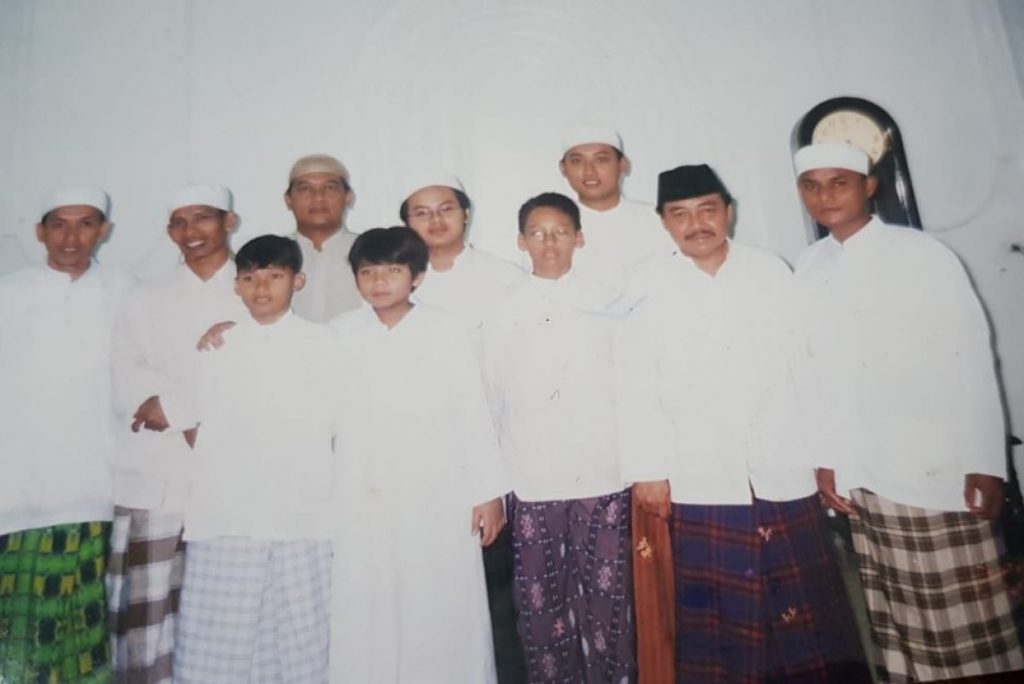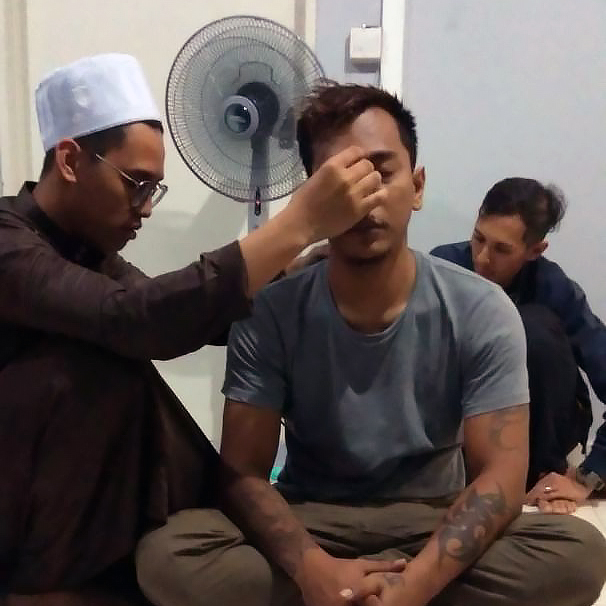Ruqyah specialist Fadhly Rosli crouches, the length of his body almost touching the floor. With his phone’s flashlight as a reliable light source, his eyes peer for a better look under the bed, all the while reciting some prayers quietly to himself. Ustadz Fadhly lifts the mattress with his right hand while his left reaches in, extracting a small rounded object wrapped in yellow cloth, no bigger than a piece of chocolate.
He mutters to himself, “Bismillah….” followed by a string of Arabic prayers, and carefully observes the object.
“This is called Buhul,” Fadhly addressed the camera. “It is usually hidden in unexpected corners in your house by those who want to harm you. It is common to hide this under the bed. That’s why I checked this spot first.”
Buhul in Malay means ‘knot’, but it also refers to any piece of object that may be used to store black magic spells intended to harm its victim. Charm paper, bones, a roll of thread, needles, animal skin, and a piece of lead are common objects used as buhul. The buhul is usually secured inside a knotted wrapping and then “tied” to the energy field of its victim by hiding it in their personal space.
Unsuspecting victims who have been attacked by black magic usually suffer from inexplicable physical or mental illness or a string of misfortunes. It is Fadhly’s job to help them remove these spells through the guidance of the Qur’an.
His prescription is usually straightforward. If any magical object needs to be removed, he would locate it and recite Islamic verses to neutralise its energy. He then disposes of it properly. If the victim is directly possessed by jinn (spirits), he will recite prayers to banish them.
He usually asks his patients to drink Ruqyah-blessed water and recite prayers on their own, daily for some time. Sometimes, he asks his patients to keep doing prescribed rituals around the house with the water, eat dates, and take care of their spiritual, physical, and mental health until the black magic has completely been neutralised.
Ustadz Fadhly is highly sought after in Singapore by clients who can attest to the efficacy of his Ruqyah skills. It was very difficult for me to arrange an interview with Fadhly as his schedule is packed—Monday to Sunday from 10 am to 10 pm—and sometimes he even has to work past midnight.
It seems that, contrary to popular belief, spiritual disturbances and witchcraft are surprisingly prevalent in Singapore. Religious healers like Fadhly are the only hope for victims to defend themselves against these malicious attacks.

The making of a Ruqyah Specialist
32-year-old Fadhly was born into a Malay/Muslim family, devoted to deepening their religious belief and practice. When Fadhly was ten, his family sent him to Indonesia to study at a pesantren, a Muslim education school in Bogor, Indonesia, all the way until senior high. He studied Islam among other subjects and lived in a dormitory with other pesantren students.
At the age of 13, he witnessed first-hand a friend possessed by an evil spirit, helped by an Ustadz who performed an exorcism by reciting prayers. This experience opened his eyes to Islamic Ruqyah—the practice of treating illnesses and spiritual disturbances through Quranic verses and invocations as prescribed by the Messenger of Allah.
Fadhly became an apprentice to a Ruqyah master in Bogor for another four years before establishing his own practice. He shared that he does not have any sixth sense or special abilities to learn how to do this. Instead, he puts complete faith in Allah and the Qur’an—the sacred scripture of Islam, believed by Muslims to be a revelation from God.
The practice of Ruqyah is covered in the Qur’an and does not conflict with Islamic teachings. Esteemed Muslim scholars have been studying and passing down the skills from generation to generation—the renowned Sheikh Wahid Abdussalam Bali from Egypt had written extensively on this subject.
“In the Qur’an, Allah mentioned that other-worldly creatures such as jinns were created to exist side by side with humans. The Qur’an also acknowledges that the practice of black magic and witchcraft is real and that there are ways to defend against jinns and black magic through Islam,” explained Fadhly. “Being a Ruqyah expert is like being a specialist. Just like a doctor, you have a specialist for different purposes.”
According to Fadhly, it’s a fallacy that all Muslim Ustadz knows how to practice Ruqyah—it is a separate specialisation that needs to be learnt through an apprenticeship with a master. This profession requires dedication, discipline, unshakeable faith in Islam, as well as the courage to pursue one’s calling in this direction. It is not easy.
“Not all Ustadz want to become a Ruqyah expert since this practice is risky and can be dangerous, given that one has to deal with black magic and the spirit world regularly,” Fadhly added. “However, for me, since witnessing my friend’s experience, I felt a calling to pursue this practice. I guess it is an extremely personal journey—only if you feel the calling should you then do it.”
After learning as much as he could in Indonesia, Fadhly returned home. He has since served Singaporeans as one of the most well-known Ustadz and Ruqyah specialists.

Natural illness vs black magic and spirit possession
One thing in the interview that made me believe Fadhly’s credibility more was when he kept acknowledging that there is a difference between actual illness and spiritual possession or black magic. He shared that when a patient develops a mysterious physical or mental illness, behaves strangely, or experiences misfortunes continuously, it could be attributed to natural causes.
“It could be that the patient is sick, physically or mentally, and that the patient is just unlucky to experience a string of unfortunate mishaps. That’s why I always check beforehand whether this is a case that needs Ruqyah’s solution or a medical professional’s help.”
Fadhly said he usually starts by asking for detailed explanations of the nature of the problem. What is happening at home and in the patient’s personal life? How does the illness feel? Is it a headache or difficulty in breathing? Is the patient sleeping well? What are his thoughts and dreams when sleeping?
“If the patient has an external situation that worries them, obviously the patient will feel stressed, thereby affecting their physical and mental health. However, if these disturbances came out of the blue, then it could be due to supernatural causes.”
The most telling situation is when even doctors are clueless about what is causing a patient to exhibit certain symptoms.
“Sometimes the patient has an inexplicable physical illness, and even after extensive consultation with a doctor, complete with an X-ray and other scientific methods of investigation, nobody can tell what is happening.”
One example Fadhly put up on his Instagram was of a patient who vomited red phlegm despite having neither eaten anything red in colour nor suffered from any respiratory problem.
Usually, suppose the patient experiences sleep paralysis, persistent difficulty of breathing, and inexplicable fear upon trying to fall asleep. In that case, there is a high probability that this is due to spirit disturbances.
After confirming his diagnosis, Fadhly would start to investigate the source of the disturbances. If any buluh or charmed objects are placed within the house, Fadhly will use his ‘sensing’ skills to locate this object and remove it. If the patient is directly possessed by jinn, Fadhly will recite prayer verses right away to expel these evil spirits.
Two main reasons may cause a patient to experience supernatural disturbances. One is from black magic, in which a shaman casts black magic spells against the victim. Another common cause is when the patient accidentally disturbs the spirit world, and the spirits they offended comes upon the patient for vengeance.
“Usually, it takes several sessions before the patient recovers fully, so we have to be realistic,” Fadhly said. “In-between sessions, the patient has to deepen religious practices himself by praying and meditating daily and doing self-Ruqyah that I prescribe. But usually, after six months, some of my patients would have been completely cured. It’s not a guarantee by any means; that is still up to God’s will.”
Sometimes, if the attackers are persistent, they will cast another spell on the victim, and after complete healing, the victim will come down with another illness. At times, the jinn being dealt with are especially strong, in which case, Fadhly would require more time and assistance to combat them.
He recalled that during one exorcism session in Bedok, Fadhly’s assistant was attacked and partially possessed by the jinn. Fadhly had to take over to banish these spirits from both the patient and his assistant.
“Alhamdulillah. I have not been adversely affected throughout all my years in the profession,” Fadhly said. “I’m not sure why either. Perhaps I’m blessed to be better able to withstand the challenges of being a Ruqyah healer. I know of many others who are much, much better than I am. But at the crux of it, all these things we do as healers are by the will of Allah; nothing happens without His permission. I just pray every day for my own protection, spray myself with plenty of Ruqyah water, and use jujube leaves.”

The Ruqyah specialist with an eye for social media
There is a common misconception that, as a modern nation with forward-thinking citizens, religious healing and exorcism might be perceived as irrational and out of fashion in Singapore. This perception could not be further from the truth. Fadhly shared that his phone is constantly ringing, and he regularly has back to back appointments.
“My clients know me either through word of mouth, from my media appearances or social media,” Fadhly quipped. “If you are good at this practice, people will know and find you, as this profession is considered quite a niche, and not many people take it up in Singapore.”
Charging between S$150 to S$200 per session, Fadhly usually takes bookings at 2-hour slots each time, starting from 10 am and ending at 10 pm though there have been times when he had to attend appointments past midnight.
His audience is primarily Malay, although he also gets requests from people from other religious and racial backgrounds, including Chinese and Indians. His clients include public figures, for instance, local actress Syirah Jusni, who raved about Fadhly’s help on her social media. He gets various requests from corporate clients, too, usually to bless a business location or a development project.
“Once, MediaCorp was filming a series on haunted places in Singapore, and I got looped in to help bless and shield these places during filming,” he recalled.
Even more surprisingly, Fadhly’s clients are primarily younger Singaporeans, aged between 24 to 30. He said many of them found him through his social media presence. Fadhly openly posts about his teachings and practice on Instagram, and as of the moment, he has 29,100 followers on the platform.
“My social media approach works when communicating with a younger audience, but I was not strategically planning to target them. As a young person myself, I just wanted to share things I thought would be interesting for people to know.”
Fadhly believes that religion is still very much relevant to young Singaporeans. Their faith is not dwindling, and he believes that religion will still play an essential role in guiding and protecting Singaporeans in the foreseeable future. “Life is unpredictable. When there is nowhere else to turn to, only our faith can keep us strong to tide through bad times.”
Throughout the pandemic, Fadhly has become even busier than usual. Experts have voiced concerns over the increase of mental health issues and even suicide among Singaporeans during this unprecedented global crisis. This has, in turn, encouraged many people to turn to religion to seek help for their anxieties and stress.
“I have had more calls during the pandemic, but frankly, many patients turn out to experience mental illness caused by normal stressors instead of supernatural causes. It’s to be expected during these hard times,” Fadhly testified. “When this happens, I usually console them and guide them using tenets of Islam. I tell them to deepen their faith and pray more, but by the end of the day, I would recommend that they seek professional help.”

Leading by faith and devotion
Fadhly vows to continue being a leader in Islam and Ruqyah and help as many people as possible who come across his path.
“I never reject a call for help, even when I’m tired and I want to sleep,” Fadhly said, “If someone calls me at 2 am, then it must be urgent. How can I say no to them? There is barely anyone else to turn to when it comes to supernatural disturbances.”
Fadhly is thankful that he has a wife who understands his work demands and his commitment to his followers, though, at times, he fears for his family, especially with two young kids in tow.
“It is not easy to be a Ruqyah specialist. Even your family might be at risk to be attacked by shamans, but, alhamdulillah we have always been protected by Allah so far.”
His primary motivation is not money but to help and guide people to be closer to Islam. This is also why he started his social media profile. While other Ustadz and Ruqyah specialists might be uncomfortable with fame and attention, Fadhly sees this platform as an opportunity to spread Islamic teaching and Ruqyah practice as widely as possible.
Fadhly reflected, “As long as what I broadcast on social media is not to glorify myself, but to glorify Allah SWT and to create awareness of his power, there is nothing wrong with being a social media influencer.”





